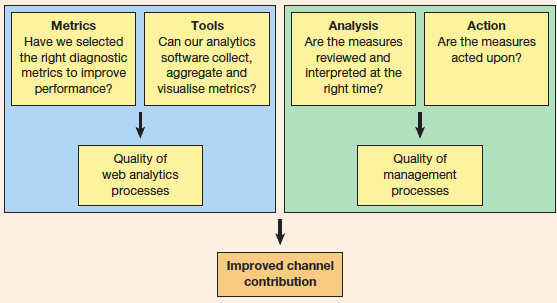Our suggestions on getting more from your web analytics
Rather than just looking at predictions or trends in analytics, I've tried to make these practical to show quick wins or changes to your digital strategy which can help get better results.
5 success factors for your web analytics in 2011
Since we're big advocates of using Google Analytics, we've tried to apply many of these practical suggestions to Google Analytics.
1. Make Smarter use of your analytics.
I think it's fair to say that no organisation gets anything near the potential value from their web analytics.
As Avinash Kaushik recently put it:
"Make no mistake. . . we all work really hard with the best of intentions. Yet we end up having negligible impact in terms of creating data driven organisations".
As my diagram below shows, a top-level what is involved to get it right - you can see it's a people problem. The good news, is that if you're in a smaller organisation it's easier to get right! So it's well worth checking you can answer these questions?
- What are our KPIs for digital marketing or Ecommerce?
- Do we have dashboard(s) that highlight your "critical few" metrics so we can see the wood from the trees?
- Are responsiblities clear for reviewing your KPIs and more importantly who acts on them?
- How often are different types of measures reviewed?
- Do we have a method of alerting us to problems or opportunities in digital marketing revealed by our web analytics?

2. Go beyond the basic tagging and profile setup. When I work with marketers on training courses I find that often many tracking features which I think should be standard aren't setup. Here are just a few of them from basic to advanced.
- No/insufficient goals setup, or no value attached
- On-site search not setup - often due to a lame implementation of search by developers which doesn't expose the search query parameter in the URL
- Limited use of custom advanced segments to understand different audience groups
- No use of custom reports
- No use of event tracking to see which calls-to-action are effective
- No use of custom variables (more on this more advanced opportunity next week)
- Awareness of the benefits of AB or multivariate testing through Google Website Optimiser, but insufficient push to get a project up and running (we're guilty of this)
To help here I've written a guide on 6 steps to help audit your Google Analytics setup.
3. Use intelligent alerts. I'm a big fan of the Google Analytics custom intelligence alerts (not the automated alerts) since they help the process of making analytics useful by alerting marketers to problems or opportunities rather than us having to remember to review at a set time - so partly helping with the first issue.
Read my tutorial on the Google Intelligence features.
4. Personalisation - integration of use behaviour with on-site and .
The overlap between analytics and personalisation features continues to blur. Unfortunately Google Analytics cannot readily be used for individual tailoring of messages on site or in emails due to privacy constraints, but with the use of custom variables this is possible as this example shows.
A trend here is the increasingly low cost availability of onsite personalization services which we reported on last year.
While it would be fantastic for marketers if we offer behavioural retargeting through the major social networks such as Facebook, Twitter and Linked In that would certainly give a great sales uplift. Perhaps if Google rather than Microsoft had equity within Facebook this could happen.
5. Respect privacy. The fourth point brings me to a big cloud hanging over all of digital marketing and analytics and display advertising in particular.
In 2010 there was a major backlash in the US about behavioural targeting. So we can expect more legislation, especially in Europe.
In Brian Clifton's ten predictions on web analytics for 2011 this was mentioned as the number one issue.
I can't really foresee a silver lining to this cloud other than to say that we've been here before with the outcry against Doubleclick in 2001 Internet users initiated proceedings against DoubleClick. Of course Google owns Doubleclick now, so watch this space.
It's also a positive that consumers will become more aware of the value they may get from more relevant messages as new education campaigns are started by the IAB, WAA and others.








